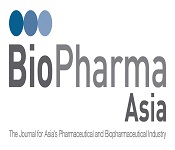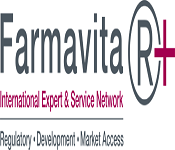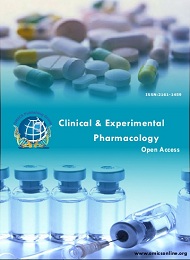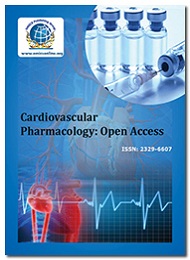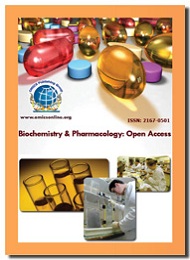Theme: Sights and Insights into Pharmacology and Toxicology
Pharmacology Congress 2017
ConferenceSeries Ltd invites all the participants from all over the world to attend ‘8th World Congress on Pharmacology and Toxicology’ during July 24-26, 2017, Melbourne, Australia which includes prompt keynote presentations, Oral talks, Poster presentations and Exhibitions.,
Pharmacology Congress 2017 is a global conclave to discuss and learn about the sessions viz., Pharmacology, Neuropharmacology and Psychopharmacology, Clinical pharmacology and receptor theory, Pharmacokinetics and Pharmacodynamics, Cardiovascular and Ethno pharmacology, Pharmacogenetics and Pharmacogenomics, Drug Screening and Discovery, Toxicology and Toxicology Studies, Food and Chemical Toxicology, Drug Toxicology, Environmental Toxicology, Human Toxicology, Toxicology Risk Assessment, Toxicology Consulting, Genetic Toxicology, Toxicology Global Market, Toxicological Pharmacovigilance, Toxicologist Reports Market analysis and Business Opportunity. ConferenceSeries Ltd organizes a conference series of 3000+ Global Events with over 600+ Conferences, 1200+ Symposiums and 1200+ Workshops in USA, Europe & Asia with support from 1000 more scientific societies and publishes 700+ Open access journals which contains over 30000 eminent personalities, reputed scientists as editorial board members.
Track 1: Pharmacology
Pharmacology is the study of how substances interact with living organisms to produce a change in function. It deals with the research, discovery, and characterization of chemicals which show biological effects and the illumination of cellular and organism function in relation to these chemicals. If substances have medicinal properties, they are considered pharmaceuticals. The Pharmacology encompasses mechanisms of drug action, drug composition and properties, interactions, toxicology, therapies, medical applications, and antipathogenic capabilities.
Related Conferences
9th Euro-Global Toxicology Congress and Applied Pharmacology Congress June 22-24, 2017 Paris, France; 9th Pharmacology Congress, August 07-09, 2017 Paris, France;11th Global Toxicology Congress and Risk Assessment Meeting October 10-12, 2017 London, UK; 3rd Global Genomics Congress and Toxic genomics Congress September 21-22, 2017 Toronto, Canada; International Toxicology congress and Clinical Pharmacology December 7-9, 2017 Madrid, Spain; 15th International Toxicology Congress and Clinical Pharmacology December 14-16, 2017 Dubai; 53rd European Societies of Toxicology, September 10-13, 2017, Bratislava, Slovak; Society of Environmental Toxicology and Chemistry, North America 38th Annual Meeting, November 12–16, 2017, Minneapolis, Minnesota, United States, 62nd Annual Conference on Association of Cardiovascular And Thoracic Surgeons February 18-21, 2016, India; European Society of Cardiology Congress August 27-31, 2016, Italy; The Cardiac Society of Australia and New Zealand ASM August 4-7, 2016, Academy of Toxicological Sciences; American Board of Toxicology; Society of Toxicology of Canada; International Union of Toxicology; American College of Medical Toxicology; Argentine Toxicological Association; Austrian Society of Toxicology; Colombia Society of Toxicology
Track 2: Neuropharmacology & Psychopharmacology
Psychopharmacology is the learning of the effects of medication on the psyche (psychology), observing changed behaviours and how molecular events are manifest in a measurable behavioural form. Neuropharmacology is the study of the effects of medication on central and peripheral nervous system performance. Principles related to psychopharmacology. Neurogenesis and repair deal with other aspects on the indications for medications prescribed to address psychiatric and behavioural problems, that are associated with, including antipsychotic, anxiolytic and anticonvulsant medications, acquired brain injury and Neurocognitive effects associated with therapeutic drugs also include mood stabilizers and treatments prescribed for disorders of attention. The treatments may cause side effects such as induction of the metabolic syndrome, type-2 diabetes related to the medications prescribed for management of psychiatric and behavioural disorders and disturbances. Ethno psychopharmacology also deals with the biotransformation and metabolism of medications, as well as specific differential actions: i.e., CYP450 enzymatic inhibition and induction of metabolism of psychopharmacological and herbaceutical substrates.
Related Conferences
7th Global Experts Meeting on Neuropharmacology Congress, July 31-Aug 02, 2017 Milan, Italy; 10th International Pharmaceutics congress & Novel Drug Delivery Systems Congress, 9th Pharmacology Congress, August 07-09, 2017 Paris, France; March 13-15, 2017 London, UK; 6th Global Cardiovascular Pharmacology Congress and Cardiac Medications Congress, April 13-14, 2017 Dubai, UAE; 9th Euro-Global Toxicology congress and Applied Pharmacology Congress June 22-24, 2017 Paris, France; 53rd European Societies of Toxicology, September 10-13, 2017, Bratislava, Slovak; 56th Annual Meeting of Society of Toxicology March 12-16, 2017 Baltimore USA; 15th International Conference on Toxicology and Clinical Pharmacology December 14-16, 2017 Dubai; European Federation of Neurological Societies National Institute of Neurological Disorders and Stroke, Australian Neuroscience Society, The American Clinical Neurophysiology Society, International Society of Neuropathology(ISN), International Society of Psychoneuroendocrinology (ISPNE)
Track 3: Clinical Pharmacology & Receptor Therapy
Clinical Pharmacology has been practiced for centuries through observing the effects of herbal remedies and early drugs on humans. The pharmacologic effect that a medication has on the body is known as pharmacodynamics. Pharmacokinetic and pharmacodynamics parameters become important because of the association between host drug concentrations, microorganism eradication, and resistance. Since long scientific advances allowed scientists to come together with the study of physiological effects with biological effects Receptor theory for drug effects and its discovery with clinical pharmacology has stretched out to be a multidisciplinary field and has contributed to the findings of drug interaction, therapeutic effectiveness and safety. Drug interactions and pharmacological compatibilities include the study of pharmacokinetics that includes the absorption, distribution, metabolism, and elimination of drugs. The pharmacologic effect that a medication has on the body is known as pharmacodynamics. Pharmacokinetic and pharmacodynamics parameters become especially important because of the association between drug application, microorganism abolition, and resistance.
Related Conferences
7th Global Experts Meeting on Neuropharmacology congress, July 31-Aug 02, 2017 Milan, Italy; 10th International Pharmaceutics congress & Novel Drug Delivery Systems Congress, March 13-15, 2017 London, UK; 6th Global Cardiovascular Pharmacology Congress and Cardiac Medications Congress, April 13-14, 2017 Dubai, UAE; 9th Pharmacology Congress, August 07-09, 2017 Paris, France; 9th Euro-Global Toxicology congress and Applied Pharmacology Congress June 22-24, 2017 Paris, France; 56th Annual Meeting of Society of Toxicology March 12-16, 2017 Baltimore USA; 53rd European Societies of Toxicology, September 10-13, 2017, Bratislava, Slovak; 56th Annual Meeting of Society of Toxicology March 12-16, 2017 Baltimore USA; 53rd European Societies of Toxicology, September 10-13, 2017, Bratislava, Slovak; Society of Environmental Toxicology and Chemistry, North America 38th Annual Meeting, November 12–16, 2017, Minneapolis, Minnesota, United States; Federation of European Neuroscience Societies (FENS) European Association for Clinical Pharmacology and Therapeutics (EACPT); Chinese Pharmacological Society; American society for Clinical Pharmacology (ASCPT); The Australian society of clinical and experimental pharmacologists and toxicologists (ASCEPT); British Pharmacological Society (BPS); Chinese Pharmacological Society; American Society for Clinical Pharmacology and Therapeutics.
Track 4: Pharmacokinetics and Pharmacodynamics
Pharmacodynamics is the effect that drugs have on the body; while pharmacokinetics is the study of the way in which drugs move through the body during absorption, distribution, metabolism and excretion. Pharmacokinetics influences decisions over the route of administration. For drugs to produce their effects they must interact with the body. This can happen in many ways and depends on the properties of the drug, and will be discussed later in this chapter. Pharmacokinetics influences decisions over the route of administration. The processes that occur after drug administration can be broken down into four distinct areas (known as ADME):
-
A Absorption of the drug
-
D Distribution of the drug molecules
-
M Metabolism of the parent drug
-
E Excretion or elimination of the drug and its metabolites
Related Conferences
9th Euro-Global Toxicology congress and Applied Pharmacology Congress June 22-24, 2017 Paris, France; 11th Global Toxicology congress and Risk Assessment Meeting, October 10-12, 2017 London, UK; 12th International Environmental Toxicology congress and Ecological Risk Assessment Congress, October 19-20, 2017 Atlanta, USA;56th Annual Meeting of Society of Toxicology March 12-16, 2017 Baltimore USA; 53rd European Societies of Toxicology, September 10-13, 2017, Bratislava, Slovak; 9th Pharmacology Congress, August 07-09, 2017 Paris, France; 56th Annual Meeting of Society of Toxicology March 12-16, 2017 Baltimore USA; 53rd European Societies of Toxicology, September 10-13, 2017, Bratislava, Slovak; Society of Environmental Toxicology and Chemistry, North America 38th Annual Meeting, November 12–16, 2017, Minneapolis, Minnesota, United States; European Association for Clinical Pharmacology and Therapeutics (EACPT); Chinese Pharmacological Society; American society for Clinical Pharmacology (ASCPT); The Australian society of clinical and experimental pharmacologists and toxicologists (ASCEPT); British Pharmacological Society (BPS); Chinese Pharmacological Society; American Society for Clinical Pharmacology and Therapeutics.
Track 5: Cardiovascular and Ethno pharmacology
Cardio pharmacodynamics of digitalis is most frequently used to increase the adequacy of the circulation in patients with CCF and to slow the ventricular rate in patients with atrial fibrillation or flutter NB: the main action of digitalis is its ability to increase myocardial contractility its positive isotropic action results in, a. increased cardiac output, b. decreased heart size, c. decreased venous pressure, d. decreased circulating blood volume. e. neural tissue being responsible for indirect cardiac actions of the drug finally, changes to the circulation brought about by digitalis frequently result in reflex autonomic & hormonal changes which effect the CVS. Role of drugs in coronary circulation the circulatory system is busy providing oxygen and nourishment to every cell of the body, let's not forget that the heart, which works hardest of all, needs nourishment. Ethnopharmacology is to identify the objectives of a largely virtual field whose self-identified membership represents a diverse suite of academic and applied disciplines, as well as commercial interests. Integrative Pharmacological Investigations include conglomeration of more number of pharmacological aspects and aggregated scientific research of two or more drugs. Natural products of chemistry in drug discovery play a vital role in bringing advances in traditional drug treatments. Chemistry and structural elucidation of drugs accelerate potential treatment options in the evolving developmental changes. Natural and synthetic derivatives in pharmacological studies are important aspect of advances in the development and investigation that avoid adverse drug reactions of the synthetic medicine. Mere change in the structures of the drugs can cause potential differences in efficacy and therapeutics of drug treatment.
Related Conferences
6th Global Cardiovascular Pharmacology Congress and Cardiac Medications Congress , April 13-14, 2017 Dubai, UAE;11th Global Toxicology congress and Risk Assessment Meeting, October 10-12, 2017 London, UK; 12th International Environmental Toxicology congress and Ecological Risk Assessment Congress, October 19-20, 2017 Atlanta, USA; 9th Euro-Global Toxicology Congress and Applied Pharmacology Congress June 22-24, 2017 Paris, France; 9th Pharmacology Congress, August 07-09, 2017 Paris, France;11th Global Toxicology Congress and Risk Assessment Meeting October 10-12, 2017 London, UK;Annual Conference on Association of Cardiovascular And Thoracic Surgeons February 18-21, 2016, India; European Society of Cardiology Congress August 27-31, 2016, Italy; The Cardiac Society of Australia and New Zealand ASM August 4-7, 2016;56th Annual Meeting of Society of Toxicology March 12-16, 2017 Baltimore USA; 53rd European Societies of Toxicology, September 10-13, 2017, Bratislava, Slovak; Society of Environmental Toxicology and Chemistry, North America.
Track 6: Pharmacogenetics and Pharmacogenomics
Recent advances in DNA repair are DNA interstrand cross-links (ICLs) are lesions caused by a variety of endogenous metabolites, ecological exposures, and cancer chemotherapeutic agents that have two reactive groups. The general feature of these diverse lesions is that two nucleotides on opposite strands are joined covalently. Mutagenicity and carcinogenicity are clearly correlated. The somatic mutation theory of cancer holds that these agents cause cancer by causing the mutation of somatic cells. A unique feature of inter-strand cross-links repair is that both strands of DNA must be incised to completely remove the lesion. Drug dosing guidelines accomplished in sequential steps to prevent creating multiple double-strand breaks. Understanding the specificity of mutagens in bacteria has led to the direct implication of certain environmental mutagens in the causation of human cancers.
Related Conferences
9th Euro-Global Toxicology Congress and Applied Pharmacology Congress June 22-24, 2017 Paris, France; 11th Global Toxicology Congress and Risk Assessment Meeting October 10-12, 2017 London, UK; 3rd Global Genomics Congress and Toxic genomics Congress September 21-22, 2017 Toronto, Canada; International Toxicology congress and Clinical Pharmacology December 7-9, 2017 Madrid, Spain; 15th International Toxicology Congress and Clinical Pharmacology December 14-16, 2017 Dubai; Predicting Drug Toxicity, June 13-14, 2017, Boston, USA, 56th Annual Meeting of Society of Toxicology March 12-16, 2017 Baltimore USA; 53rd European Societies of Toxicology, September 10-13, 2017, 9th Pharmacology Congress, August 07-09, 2017 Paris, France; Bratislava, Slovak; 56th Annual Meeting of Society of Toxicology March 12-16, 2017 Baltimore USA; 53rd European Societies of Toxicology, September 10-13, 2017, Bratislava, Slovak; Society of Environmental Toxicology and Chemistry, North America; European Federation of Neurological Societies National Institute of Neurological Disorders and Stroke, Australian Neuroscience Society, The American Clinical Neurophysiology Society, International Society of Neuropathology(ISN), International Society of Psychoneuroendocrinology (ISPNE), Autism Society, Schizophrenia International Research Society, Society for Neuroscience (SFN)
Track 7: Drug Screening and Discovery
Reverse pharmacology includes drug screening deals with reverse pharmacology and forward pharmacology are two approaches to drug discovery. Target based drug discovery is the process through which potential new medicines are identified. It involves a wide range of scientific disciplines, including biology, chemistry and pharmacology, screening of chemical libraries and its pharmacology, methods to determine biological targeting, by systematically perturbing and interrogating biological pathways with synthetically novel chemical tools, preclinical validation of target biology is beginning to illuminate a more cost effective and efficient paradigm for the development of novel drugs modulating novel targets.
Related Conferences
6th Global Cardiovascular Pharmacology Congress and Cardiac Medications Congress, April 13-14, 2017 Dubai, UAE; 9th Euro-Global Toxicology congress and Applied Pharmacology Congress June 22-24, 2017 Paris, France; 11th Global Toxicology congress and Risk Assessment Meeting, October 10-12, 2017 London, UK; 12th International Environmental Toxicology congress and Ecological Risk Assessment Congress, October 19-20, 2017 Atlanta, USA; 19th International Conference on Predictive Human Toxicity, February 16 - 17, 2017, London, United Kingdom; 9th Pharmacology Congress, August 07-09, 2017 Paris, France; Predicting Drug Toxicity, June 13-14, 2017, Boston, USA, 56th Annual Meeting of Society of Toxicology March 12-16, 2017 Baltimore USA; 53rd European Societies of Toxicology, September 10-13, 2017, Bratislava, Slovak; 56th Annual Meeting of Society of Toxicology March 12-16, 2017 Baltimore USA; Chinese Pharmacological Society; American Society for Clinical Pharmacology and Therapeutics. Academy of Toxicological Sciences; American Board of Toxicology; Society of Toxicology of Canada; International Union of Toxicology; American College of Medical Toxicology; Argentine Toxicological Association; Austrian Society of Toxicology; Colombia Society of Toxicology
Track 8: Toxicology
Toxicology is the scientific study of adverse effects that occur in living organisms due to chemicals. It involves observing and reporting symptoms, mechanisms, detection and treatments of toxic substances, in particular relation to the poisoning of humans. It includes environmental agents and chemical compounds found in nature, as well as pharmaceutical compounds that are synthesized for medical use by humans. These substances may produce toxic effects in living organisms including disturbance in growth patterns, discomfort, disease and death. LD50 is a common term used in toxicology, which refers to the dose of a substance that displays toxicity in that it kills 50% of a test population. In scientific research, rats or other surrogates are usually used to determine toxicity and the data are extrapolated to use by humans.
7th Global Experts Meeting on Neuropharmacology congress, July 31-Aug 02, 2017 Milan, Italy; 10th International Pharmaceutics congress & Novel Drug Delivery Systems Congress, March 13-15, 2017 London, UK; 6th Global Cardiovascular Pharmacology Congress and Cardiac Medications Congress, April 13-14, 2017 Dubai, UAE; 9th Pharmacology Congress, August 07-09, 2017 Paris, France; 9th Euro-Global Toxicology congress and Applied Pharmacology Congress June 22-24, 2017 Paris, France;Society of Environmental Toxicology and Chemistry, North America 38th Annual Meeting, November 12–16, 2017, Minneapolis, Minnesota, United States, 62nd Annual Conference on Association of Cardiovascular And Thoracic Surgeons February 18-21, 2016, India; European Society of Cardiology Congress August 27-31, 2016, Italy; The Cardiac Society of Australia and New Zealand ASM August 4-7, 2016;) European Association for Clinical Pharmacology and Therapeutics (EACPT); Chinese Pharmacological Society; American society for Clinical Pharmacology (ASCPT); The Australian society of clinical and experimental pharmacologists and toxicologists (ASCEPT); British Pharmacological Society (BPS); Chinese Pharmacological Society; American Society for Clinical Pharmacology and Therapeutics.
Track 9: Food and Chemical Toxicology
Food and Chemical Toxicology (FCT), an internationally renowned journal, that publishes original research articles and reviews on toxic effects, in animals and humans, of natural or synthetic chemicals occurring in the human environment with particular emphasis on food, drugs, and chemicals, including agricultural and industrial safety, and consumer product safety. Areas such as safety evaluation of novel foods and ingredients, biotechnologically-derived products, and nanomaterials are included in the scope of the journal. FCT also encourages submission of papers on inter-relationships between nutrition and toxicology and on in vitro techniques. Furthermore new areas such as safety evaluation of novel foods and biotechnologically derived products and inter-relationships between nutrition and toxicology are welcomed. The studies may address the physiological, biochemical or pathological changes induced by specific substances, techniques for assessing potential toxicity, including molecular biology or the mechanisms underlying toxic phenomena.
Related Conferences
11th Global Toxicology Congress and Risk Assessment Meeting October 10-12, 2017 London, UK; 3rd Global Genomics Congress and Toxic genomics Congress September 21-22, 2017 Toronto, Canada; International Toxicology congress and Clinical Pharmacology December 7-9, 2017 Madrid, Spain; 9th Pharmacology Congress, August 07-09, 2017 Paris, France;15th International Toxicology Congress and Clinical Pharmacology December 14-16, 2017 Dubai; 53rd European Societies of Toxicology, September 10-13, 2017, Bratislava, Slovak; Society of Environmental Toxicology and Chemistry, North America 38th Annual Meeting, November 12–16, 2017, Minneapolis, Minnesota, United States, 62nd Annual Conference on Association of Cardiovascular And Thoracic Surgeons February 18-21, 2016, India; European Society of Cardiology Congress August 27-31, 2016, Italy; The Cardiac Society of Australia and New Zealand ASM August 4-7, 2016; Chinese Pharmacological Society; American Society for Clinical Pharmacology and Therapeutics. Academy of Toxicological Sciences; American Board of Toxicology; Society of Toxicology of Canada; International Union of Toxicology; American College of Medical Toxicology; Argentine Toxicological Association; Austrian Society of Toxicology; Colombia Society of Toxicology
Track 10: Drug Toxicology
Toxicology screens are used to identify substances affecting a patient and to guide the clinician to predict future toxic effects, to confirm the differential diagnosis or to guide therapy. Accurate diagnosis of clinical intoxication secondary to illicit drug use based on clinical history and physical examination may be difficult without laboratory confirmation. This testing is also necessary when multiple drug ingestion is involved, as the effects of one drug may mask the clinical signs and symptoms of the effects of other drugs.
Related Conferences
11th Global Toxicology Congress and Risk Assessment Meeting October 10-12, 2017 London, UK; 3rd Global Genomics Congress and Toxic genomics Congress September 21-22, 2017 Toronto, Canada; International Toxicology congress and Clinical Pharmacology December 7-9, 2017 Madrid, Spain; 15th International Toxicology Congress and Clinical Pharmacology December 14-16, 2017 Dubai; 19th International Conference on Predictive Human Toxicity, February 16 - 17, 2017, London, United Kingdom; Predicting Drug Toxicity, 9th Pharmacology Congress, August 07-09, 2017 Paris, France; June 13-14, 2017, Boston, USA, 56th Annual Meeting of Society of Toxicology March 12-16, 2017 Baltimore USA; 53rd European Societies of Toxicology, September 10-13, 2017, Bratislava, Slovak; 56th Annual Meeting of Society of Toxicology March 12-16, 2017 Baltimore USA; 53rd European Societies of Toxicology, September 10-13, 2017, Bratislava, Slovak; Autism Society, Schizophrenia International Research Society, Society for Neuroscience (SFN), Federation of European Neuroscience Societies (FENS) European Association for Clinical Pharmacology and Therapeutics (EACPT); Chinese Pharmacological Society
Track 11: Environmental Toxicology and Human Toxicology
Environmental Toxicology and Pharmacology publishes the results of studies concerning toxic and pharmacological effects of (human and veterinary) drugs and of environmental contaminants in animals and man. Areas of special interest are: molecular mechanisms of toxicity, biotransformation and toxic kinetics (including toxic kinetic modelling), molecular, biochemical and physiological mechanisms explaining differences in sensitivity between species and individuals, the characterisation of pathophysiological models and mechanisms involved in the development of effects and the identification of biological markers that can be used to study exposure and effects in man and animals. Human toxicology studies address the mechanisms/modes of toxicity that deals with the safety evaluation of novel chemical, biotechnologically-derived products, and nanomaterials for human health assessment including statistical and mechanism-based approaches. Novel methods or approaches to research on animal and human tissues (medical and veterinary patients) investigating functional, biochemical and structural disorder.
Related Conference
12th International Environmental Toxicology congress and Ecological Risk Assessment Congress, October 19-20, 2017 Atlanta, USA; 9th Euro-Global Toxicology Congress and Applied Pharmacology Congress June 22-24, 2017 Paris, France; 11th Global Toxicology Congress and Risk Assessment Meeting October 10-12, 2017 London, UK; 3rd Global Genomics Congress and Toxic genomics Congress September 21-22, 2017 Toronto, Canada; International Toxicology congress and Clinical Pharmacology December 7-9, 2017 Madrid, Spain; 9th Pharmacology Congress, August 07-09, 2017 Paris, France; 53rd European Societies of Toxicology, September 10-13, 2017, Bratislava, Slovak; 56th Annual Meeting of Society of Toxicology March 12-16, 2017 Baltimore USA; 53rd European Societies of Toxicology, September 10-13, 2017, Bratislava, Slovak; Society of Environmental Toxicology and Chemistry, North America 38th Annual Meeting, November 12–16, 2017, Minneapolis, Minnesota, United States, 62nd Annual Conference on Association of Cardiovascular And Thoracic Surgeons February 18-21, 2016, India; European Society of Cardiology Congress August 27-31, 2016, Italy; The Cardiac Society of Australia and New Zealand ASM August 4-7, 2016; 15th International Toxicology Congress and Clinical Pharmacology December 14-16, 2017 Dubai; Schizophrenia International Research Society, Society for Neuroscience (SFN), Federation of European Neuroscience Societies (FENS) European Association for Clinical Pharmacology and Therapeutics (EACPT); Chinese Pharmacological Society;
Track 12: Genotoxicity
Genetic toxicology helps discern the possibility of heritable mutations, developmental defects, cancer initiation, aging and other long-term adverse genetic effects. Genotoxicity describes the assets of chemical sellers that damage the genetic records inside cellular causing mutations, which may lead to most cancers. At the same time, genotoxicity is often stressed with mutagenicity; all mutagens are genotoxic, while no longer all genotoxic materials are mutagenic. The alteration could have direct or indirect consequences at the DNA: the induction of mutations, mistimed occasion activation, and direct DNA damage leading to mutations.
Related Conference
6th Global Cardiovascular Pharmacology Congress and Cardiac Medications Congress, April 13-14, 2017 Dubai, UAE; 9th Euro-Global Toxicology congress and Applied Pharmacology Congress June 22-24, 2017 Paris, France; 11th Global Toxicology congress and Risk Assessment Meeting, October 10-12, 2017 London, UK; 12th International Environmental Toxicology congress and Ecological Risk Assessment Congress, 9th Pharmacology Congress, August 07-09, 2017 Paris, France; October 19-20, 2017 Atlanta, USA; 9th Euro-Global Toxicology Congress and Applied Pharmacology Congress June 22-24, 2017 Paris, France; Stem Cells in Drug Discovery & Toxicity Screening, July 10-11, 2017, Boston, USA; 19th International Conference on Predictive Human Toxicity, February 16 - 17, 2017, London, United Kingdom; Predicting Drug Toxicity, June 13-14, 2017, Boston, USA, 56th Annual Meeting of Society of Toxicology March 12-16, 2017 Baltimore USA; 53rd European Societies of Toxicology, September 10-13, 2017, Bratislava, Slovak; 56th Annual Meeting of Society of Toxicology March 12-16, 2017 Baltimore USA; International Society of Neuropathology(ISN), International Society of Psychoneuroendocrinology (ISPNE), Autism Society, Schizophrenia International Research Society, Society for Neuroscience (SFN), Federation of European Neuroscience Societies (FENS) European Association for Clinical Pharmacology and Therapeutics (EACPT); Chinese Pharmacological Society.
ConferenceSeries Ltd is a renowned organization that organizes highly notable pharmaceutical conferences throughout the globe. Currently we are bringing eighth “World Congress on Pharmacology and Toxicology” (Pharmacology Congress 2017) scheduled to be held during July 24-26, 2017 at Melbourne, Australia. The conference invites all the participants across the globe to attend and share their insights and convey recent developments in the field of Pharmacology and Toxicology.
ConferenceSeries Ltd organizes a conference series of 1000+ Global Events inclusive of 1000+ Conferences, 500+ Upcoming and Previous Symposiums and Workshops in USA, Europe & Asia with support from 1000 more scientific societies and publishes 700+ Open access Journals which contains over 50000 eminent personalities, reputed scientists as editorial board members.
Pharmacology Congress 2017 focuses on the importance to understand drugs and how they can affect human physiology. It is with better understanding of Pharmacology one can know the right dosage and dosage forms of drugs. More research in pharmacology deals with identifying and responding to drug interactions and its side effects along with its mechanism of action, its therapeutic index and thereby treat accordingly. More intensive study with the interaction between drug and its therapeutic effect helps to identify the properties of ideal drugs.
Why to attend???
Join your peers around the world focused on learning about Pharmacology, toxicology and related advances, which is your single best opportunity to reach the largest assemblage of participants from the Pharmacology and toxicology community, conduct demonstrations, distribute information, meet with current and potential professionals, make a splash with a new research works, and receive name and recognition at this 3-day event. World-renowned speakers, the most recent research, advances, and the newest updates in Pharmacology are hallmarks of this conference.
Target Audience:
- Students, Scientists, Researchers, and Faculty of Pharmaceutical Universities
- Medical Colleges, Researchers from Pharmaceutical Companies, Pharmacy Associations and Societies
- Business Entrepreneurs, Training Institutes, Software developing companies
- Manufacturing Medical Devices Companies, CRO and Data Management Companies.
2017 Highlights:
- 300+ Participation (70 Industry: 30 Academia)
- 5+ Keynote Speakers
- 50+ Plenary Speakers
- 20+ Exhibitors
- 14 Innovative Educational Sessions
- 5+ Workshops
- B2B Meetings
ConferenceSeries Ltd is a renowned organization that organizes highly notable pharmaceutical conferences throughout the globe. Currently we are bringing eighth “World Congress on Pharmacology and Toxicology” (Pharmacology Congress 2017) scheduled to be held during July 24-26, 2017 at Melbourne, Australia. The conference invites all the participants across the globe to attend and share their insights and convey recent developments in the field of Pharmacology and Toxicology.
ConferenceSeries Ltd organizes a conference series of 1000+ Global Events inclusive of 1000+ Conferences, 500+ Upcoming and Previous Symposiums and Workshops in USA, Europe & Asia with support from 1000 more scientific societies and publishes 700+ Open access Journals which contains over 50000 eminent personalities, reputed scientists as editorial board members.
Pharmacology Congress 2017 focuses on the importance to understand drugs and how they can affect human physiology. It is with better understanding of Pharmacology one can know the right dosage and dosage forms of drugs. More research in pharmacology deals with identifying and responding to drug interactions and its side effects along with its mechanism of action, its therapeutic index and thereby treat accordingly. More intensive study with the interaction between drug and its therapeutic effect helps to identify the properties of ideal drugs.
Why to attend???
Join your peers around the world focused on learning about Pharmacology, toxicology and related advances, which is your single best opportunity to reach the largest assemblage of participants from the Pharmacology and toxicology community, conduct demonstrations, distribute information, meet with current and potential professionals, make a splash with a new research works, and receive name and recognition at this 3-day event. World-renowned speakers, the most recent research, advances, and the newest updates in Pharmacology are hallmarks of this conference.
Target Audience:
- Students, Scientists, Researchers, and Faculty of Pharmaceutical Universities
- Medical Colleges, Researchers from Pharmaceutical Companies, Pharmacy Associations and Societies
- Business Entrepreneurs, Training Institutes, Software developing companies
- Manufacturing Medical Devices Companies, CRO and Data Management Companies.
2017 Highlights:
- 300+ Participation (70 Industry: 30 Academia)
- 5+ Keynote Speakers
- 50+ Plenary Speakers
- 20+ Exhibitors
- 14 Innovative Educational Sessions
- 5+ Workshops
- B2B Meetings
Importance & Scope:
‘Pharmacology Congress 2017’ is a perfect platform to present and discuss current perspectives in drug research and development. Pharmacology is the study of interaction of chemical with living systems. It is a medical science that forms a backbone of the medical profession. So, it’s important to describe the pharmacological basis of therapeutics in order to maximize the benefits and minimize the risks of drugs to recipients. It is an integrative rather than an autonomous science, drawing on the techniques and knowledge of many allied scientific disciplines. Hence it will be a platform for researchers, scientists, professional involved with drug development.
Market Analysis of Pharmacology and Related Research
Healthcare CRO Market to Reach $45.2 Billion By 2022
Global Healthcare CRO industry is expected to reach USD 45.2 billion by 2022, according to a new report by Grand View Research Inc. With the increasing number of patents expiring, increasing number of partnerships to identify biologics and new compounds and growing R&D costs, drug maker and sponsor companies are under pressure to replace the revenue loss specifically due to generics, which has further made drug development more expensive and complex.
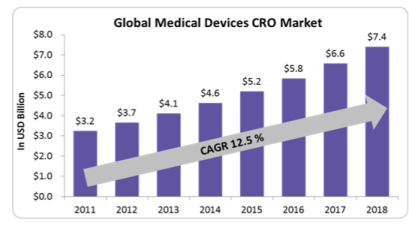
Moreover, owing to the increasing incidence rates of chronic diseases such as cancer, Alzheimer’s and other infectious diseases in children, government funding has increased, which have led to increasing R&D activities.
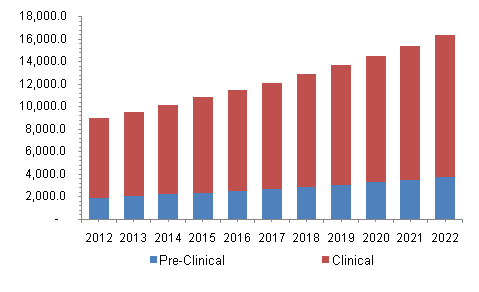
Global pharmacovigilance market, by clinical trials, 2012 – 2020 (USD Million)
Increasing incidence rates of ADR (adverse drug reaction) clubbed with the introduction of stringent government policies pertaining to drug safety regulations are some key factors expected to drive the pharmacovigilance market. Pharmacovigilance is referred as an act of collection, detection, reporting and monitoring of adverse drug reaction. The global pharmacovigilance market was valued at USD 2,408.0 million in 2013 and is expected to grow at a CAGR of 12.6% during the forecast period. ADR represents a substantial burden on healthcare systems and is one of the prominent reasons of morbidity in developed countries. Approximately 5% of total hospitalizations in a year are due to ADR which makes reporting and preventing of the same a notable growth fuelling factor for this market. Growing prevalence of chronic disorders coupled with rising geriatric population base has heightened the need for new drug development. With an upsurge in the drug production, regulatory authorities such as the U.S. FDA and EMEA (European Medicines Agency) have intensified drug safety regulations prior and post commercialization. Growing complexity of drug safety regulations is thus, expected to boost market growth during the forecast period. Additionally, there is an additional pressure from the regulators for electronic submission especially in European countries which would further accentuate the demand for this market in this region.
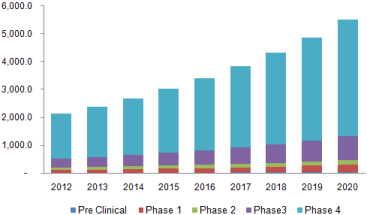
Fig 1. Clinical Trials Report
Worldwide Total Pharmaceutical R & D spend in 2006 - 2020
We are unaware of exact validated statistics which accurately estimate the volume of clinical trial logistics services. Thus, such volume is traditionally calculated as a percentage of the total clinical trials expenses. According to the forecast made by Evaluate Pharma, in the next 5 years the clinical trials market will show a stable low growth of 2-2.5% per year, while being accompanied by a significant paradigm shift in the operational structure of cold-chain logistics and clinical trial supply, the costs of which (including manufacturing), by various estimates, may reach up to 20% of the total R&D costs.
According to the same report, this trend of disproportionate growth will come from an increase in clinical trials of prescription medications where logistical expenses are traditionally higher than those of trials of generic products.
Also noteworthy is the prediction that by 2020 R&D projects of top-20 pharmaceutical companies will account for more than 60% of total clinical trial expenses.
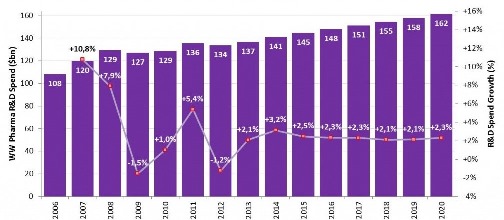
Fig 2. Worldwide Total Pharmaceutical R & D spend in 2006 - 2020
Cardiovascular Surgical Devices: Technologies and Global Markets
The global market for cardiovascular surgical devices was valued at $29.7 billion in 2012. This market is expected to reach nearly $31.7 billion in 2013 and nearly $47.2 billion by 2018, a compound annual growth rate (CAGR) of 8.3% for the period of 2013 to 2018.
BCC analyses the industry on a worldwide basis from market, product and technology perspectives. Regulations and reimbursement issues and patents issued from 2010 through mid-2013 are also examined to identify patient safety, regulatory review and insurance coverage issues for stakeholders and potential stakeholders in this industry.
Blood-Brain Barrier Technologies and Global Markets
The global market for blood-brain barrier (BBB) technology for therapeutics reached $21.8 million in 2013. This market is expected to grow from $38.7 million in 2014 to $471.5 million in 2019, a compound annual growth rate (CAGR) of 64.9% from 2014 through 2019.
Pharmacology Research and Development Forecast
Pharmaceutical industry is experiencing a rather drastic redistribution of R&D activities to new geographic regions. According to the Biopharma Cold Chain 2012 Sourcebook, in 2016 up to 65% of growth in clinical research will come from studies conducted in emerging market counties: Asia Pacific, Eastern Europe and South America. While the majority of clinical trials are initiated with the end goal of NDA approval in the US and in Western Europe, the vast majority of potential study subjects live outside of these regions. Thus, there is a clearly identifiable need to develop first-rate, cost-effective clinical trial infrastructure capabilities in Asia-Pacific region, Latin America, Eastern Europe and potentially in North and South Africa. BRICS countries have demonstrated willingness to make their patients more available to international clinical trials. For instance, Russia and China have recently taken steps towards simplifying the launch of clinical trials.
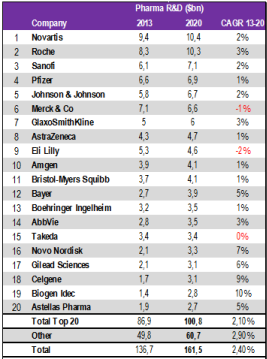
Fig 3. Pharmacology Research and Development Forecast
Major Societies of Pharmacology around the globe
- American Academy of Veterinary Pharmacology and Therapeutics
- American Board of Clinical Pharmacology
- Danish Society for Clinical Pharmacology
- American College of Clinical Pharmacology
- American Society for Pharmacology and Experimental Therapeutics
- Belgian Society of Fundamental and Clinical Physiology and Pharmacology
- Canadian Society of Pharmacology and Therapeutics
- Chinese Pharmacological Society
- Egyptian Society of Pharmacology and Experimental Therapeutics
- European Behavioural Pharmacology Society
- German Society for Clinical Pharmacology and Therapy
- Indonesia Veterinary Pharmacy and Pharmacology Association
- Japanese Society of Clinical Pharmacology and Therapeutics
- Serbian Medical Association, Section of Clinical Pharmacology
Best Global Universities for Pharmacology and Toxicology
- Harvard University
- United States Cambridge, MA
- University of North Carolina
- United States Chapel Hill
- University of California--San Francisco
- University of Washington United States Seattle
- University of California--San Diego
- United States La Jolla
- University of Copenhagen
- University College London
- Karolinska Institute
- Utrecht University
- University of Michigan--Ann Arbor
- University of Toronto
- Canada Toronto, Ontario
- Duke University
- United States Durham
- Johns Hopkins University
- United States Baltimore
Why Australia??
Australia’s pharmaceutical market is set to rise from just over $22.85 billion in 2016 to $25.2 billion by 2020, according to research and consulting firm Global Data. The reports highlight a number of opportunities open to companies hoping to invest in the Australian pharmaceutical industry, including increasing foreign direct investment (FDI), the emerging generic drugs market, and a favourable tax environment. Other major factors driving growth in Australia’s pharmaceuticals market include the increasing elderly population and its associated disease burden, along with well-defined regulatory guidelines and the rising prevalence of non-communicable diseases due to an increasingly sedentary way of life. Australia’s healthcare market is set to grow to an impressive $42.5 billion by 2020, driven by universal healthcare coverage provided by Medicare and good access to facilities such as government-subsidized medicines, according to research and consulting firm GlobalData.
The 2015 PwC pharmaceutical industry survey captures the collective views of the Australian pharma sector and explores the industry's key challenges, trends and opportunities. In recent years, the Australian pharma industry has been characterised by a more competitive market; significant advancements in technology; constrained budgets; major reform; and increasing scrutiny from payers, regulators and the community. This has led to pharmaceutical companies having to reassess their business models to ensure they remain responsive.
Conference Highlights
- Pharmacology
- Neuropharmacology & Psychopharmacology
- Clinical Pharmacology & Receptor Therapy
- Pharmacokinetics and Pharmacodynamics
- Cardiovascular and Ethno pharmacology
- Pharmacogenetics and Pharmacogenomics
- Drug Screening and Discovery
- Toxicology
- Food and Chemical Toxicology
- Environmental Toxicology and Human Toxicology
- Genotoxicity
- Nursing Pharmacology
- Ethnopharmacology
To share your views and research, please click here to register for the Conference.
To Collaborate Scientific Professionals around the World
| Conference Date | July 24-25, 2017 | ||
| Sponsors & Exhibitors |
|
||
| Speaker Opportunity Closed | Day 1 | Day 2 | Day 3 |
| Poster Opportunity Closed | Click Here to View | ||
Useful Links
Special Issues
All accepted abstracts will be published in respective Our International Journals.
- Journal of Clinical & Experimental Pharmacology
- Biochemistry & Pharmacology: Open Access
- Cardiovascular Pharmacology: Open Access
Abstracts will be provided with Digital Object Identifier by





